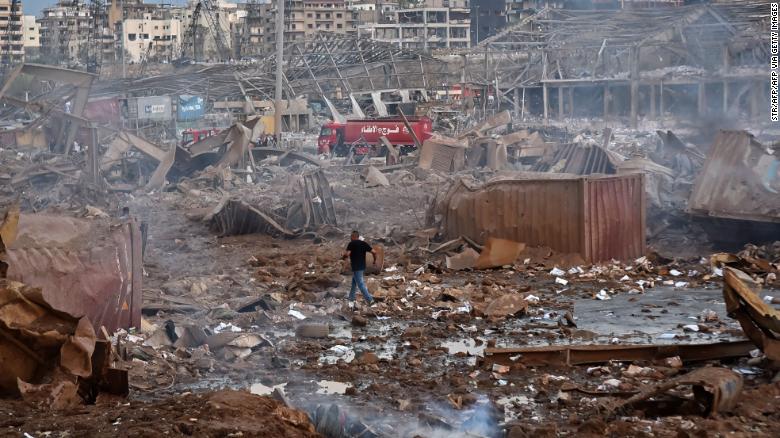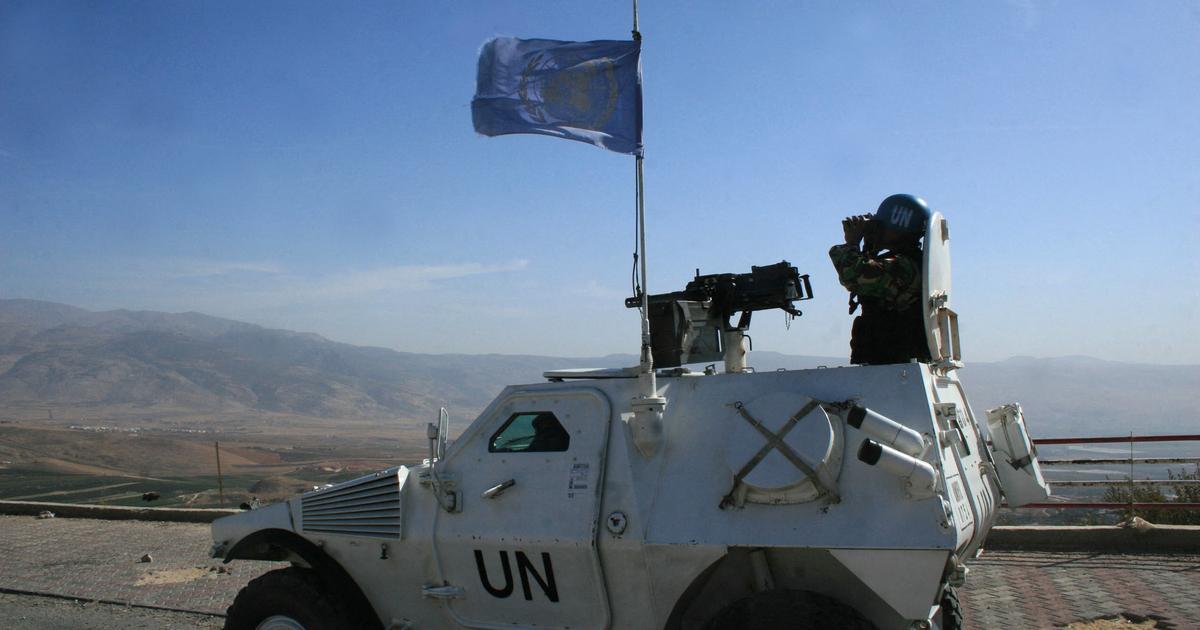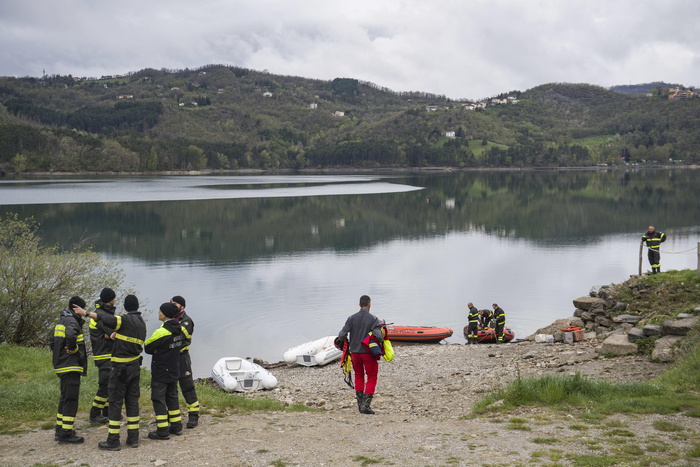Beirut: From a Russian ship to a tragic explosion 4:49
(CNN) - Shock at the devastation caused by the massive explosion in the Beirut port gave way to anger on Thursday, when new information emerged that officials in the Lebanese capital had ignored repeated warnings about an arsenal of chemicals. explosion-related hazards.
- ANALYSIS | Beirut will never be the same again
There is mounting evidence, including emails and public court documents, that officials knew of a shipment of thousands of tons of ammonium nitrate, once described as a "floating bomb," that had been confiscated by authorities. Lebanese and stored in a warehouse in the port for the past six years, to which they had not acted.
The revelation that the explosion could be attributed to government negligence has rekindled long frustration with Lebanon's political class, which plunged the country into deep debt, and the endemic corruption that filled the pockets of the wealthy elite at the expense of basic public services and infrastructure.
Beirut seeks responsible for the gigantic explosion 2:17The country was already seeing rising unemployment, rising prices and a free-falling currency; For many, the explosion is further evidence of government ineptitude and corruption.
Mass mobilization
Tuesday's explosion destroyed much of the Lebanese capital's main coastal port, leaving at least 137 dead, 5,000 wounded and hundreds of thousands homeless. The area in the immediate vicinity of the blast resembled a steaming wasteland with a 120-meter-wide crater, and the empty shells of apartment buildings drew the skyline of the city.
In downtown Beirut, an army of volunteers launched Thursday in a massive cleanup effort, with people coming from all over the city to help sweep the streets, remove debris from cars, or deliver food and water, while residents collected debris from their homes and businesses, trying to save what they could.
Lebanon's Economy Minister Raoul Nehme said all city departments and businesses were affected in some way by the blast, and state media said 90% of hotels in the Lebanese capital had been damaged.
The death toll is expected to rise amid ongoing search and rescue efforts. Many people were still missing two days after the explosion and 300,000 were displaced from their homes.
The city's emergency services, already under strain due to the covid-19 pandemic, were operating at reduced capacity after four hospitals sustained damage in the blast, which sent a shock wave felt in Cyprus, to 240 kilometers away and damaged buildings 10 kilometers away.
It is not yet exactly clear what led to the blast that swept through entire streets, but questions arose on Wednesday whether the authorities had failed to act on the warning signs.
Mexican in Lebanon: I am reliving the war 2:31On Wednesday Prime Minister Hassan Diab confirmed that 2,750 metric tons of ammonium nitrate, typically used as agricultural fertilizer and in mining explosives, had been stored for six years in a warehouse in the Beirut port without careful measures "putting the safety of citizens is at risk, ”according to a statement.
The Lebanese cabinet has ordered an unknown number of port officials to be placed under house arrest in the coming days, pending the results of an investigation into the blast, according to Ghada Shreim, the displaced persons minister. Those involved in "the storage, surveillance and investigation of Hangar 12 from 2014 to today" will be included in the arrests, Shreim said.
Explosion in Beirut, "criminal attack"
Lebanese President Michel Aoun promised a transparent investigation into the causes of the explosion and that those responsible will be brought to justice and face "severe punishment."
But years of government corruption have left little hope for ordinary citizens that the investigation will find out why such large amounts of the dangerous chemical were allowed to be stored in the city center without adequate security measures and who is responsible. .
«This accident here, this crisis, for 20 years they are going to talk about it. The investigation will never end. No conclusion, no results, "said a resident in downtown Beirut.
Jad Chaaban, associate professor of economics at the American University of Beirut, said, "This is a criminal attack by the ruling state."
"They have committed a crime by storing these nitrates for over a decade there, without accountability," said Chaaban, adding that there is growing anger among the people.
The liquidity-struggling country has been devastated by economic and political turmoil exacerbated by the consequences of the covid-19 outbreak. Violent protests erupted over rising hunger and poverty, which rose to more than 50%, and power outages are common across the city. Banks have imposed capital controls that limit the amount of money people can withdraw, and scenes of people rummaging through garbage cans to cover their basic needs have become commonplace.
This is how a girlfriend lived the moment of the explosion in Beirut 1:04Chaaban asked how the city can be rebuilt in such circumstances.
“People will go to their devastated homes, with broken glass, destroyed trucks and cars, they don't have dollars because the banks have blocked their account in dollars to pay for any importation. Prices have more than quadrupled in recent months, so nobody can afford to build anything. There is exasperation in the street and a lot of anger, "she said.
Political aftershocks
Initial reports in state media attributed the blast to a large fire at a firecracker warehouse near the port. Later, the country's chief general security officer, Abbas Ibrahim, said a "highly explosive material" had been confiscated years earlier and stored in a warehouse, a few minutes' walk from Beirut's shopping and nightlife districts.
Beirut port general manager Hassan Kraytem said on Wednesday that he knew the materials piled "in warehouse number 12" were dangerous, "but not to that extent." Maintenance was carried out at the Warehouse door 12 hours before Tuesday's explosion, according to Kraytem.
Lebanese Customs Director Badri Daher told CNN that officials had written six times to legal authorities asking for the cargo to be removed from the port, but the requests were not honored despite repeated warnings from him and others from that the charge was the equivalent of "a floating bomb."
Shipping services and documents obtained by CNN describe a shipment of 2,750 metric tons of ammonium nitrate that was stopped in Beirut in 2013. The Russian-owned ship, called MV Rhosus, was destined for Mozambique but was stopped in Beirut due to Financial difficulties that also caused riots between the Russian and Ukrainian crew of the ship.
On Wednesday, Lebanese Information Minister Manal Abdel Samad Najd said there are documents and files dating back to 2014 that prove the existence of an information exchange on the "material" confiscated by the Lebanese authorities. She told Jordanian state channel Al Mamlaka that the exchange is being considered in relation to the possible cause of the deadly Beirut explosion.
When asked in a telephone interview if there are any early findings in investigations related to the cause of the explosion, he said: "There are no preliminary results or clarifications."
Satellite images show devastation in Beirut 0:20Calls for an international investigation into the explosion have been growing. "Former prime ministers Najib Mikati, Fouad Siniora, Saad Hariri and Tammam Salam consider it necessary to request the United Nations or the Arab League to form an international or Arab investigative committee," according to a joint statement released by Hariri's office.
Rami Khouri, an adjunct professor of journalism at the American University of Beirut and a senior fellow at Harvard University, said: "My expectation is that the political aftershocks will be as great as the explosion itself."
“This explosion was the culmination of decades of misgovernment that has destroyed almost every aspect of the lives of some people in Lebanon. And all they want is to get rid of these people who rule the country, "he said.
Food and medical supplies shortages
There is also growing fear of food and medicine shortages, as the port where the explosion occurred is the main maritime center of a nation that is highly dependent on foreign goods, with 60% of all imports passing for him.
Beirut's main grain silo, located at the port, was severely damaged in the blast and the grain supply stored there was destroyed or rendered unusable as a result of chemicals released into the air during the blast, said the economy minister Nehme. He added that there are additional grain warehouses in mills and other ports in the country.
Tuesday's blast resulted in damage estimated at between $ 3 billion and $ 5 billion, Beirut Governor Marwan Abboud told reporters on Wednesday. Although Nehme said that "nobody can know the numbers at this time", but that "it is very high and more than our capacity."
Ammonium nitrate could be cause of explosion in Beirut 1:23The economy minister said the government's priority was to ensure people's basic needs, primarily food, but also supplies to help repair extensive damage to homes and infrastructure throughout the city.
"We need glass, aluminum, wood, doors ... everything was damaged," he said.
World leaders, including those of Israel, the United Kingdom, the United States, France, Turkey, the United Arab Emirates, Jordan, Kuwait, Qatar, Russia and Spain, have offered support and humanitarian medical assistance to Lebanon.
Lebanese Health Minister Hamad Hassan said there was an emergency plan with hospitals dispatched from Qatar, Iran, Kuwait, Oman and Jordan. Hassan estimates that six to eight field hospitals will be ready "soon."
Mary Ilyushina, Katie Polglase, Isaac Yee, Charbel Mayo, Jessie Yeung, Raja Razek, Samantha Beech, Mostafa Salem, Kareem Khadder, Schams Elwazer, Mohammed Tawfeeq, Tara John, Alessandria Masi, Nada AlTaher, Hamdi Alkhshali, Amir Tal, Andrew Carey Jennifer Hansler and Paul Murphy contributed to this report.
Beirut explosion














